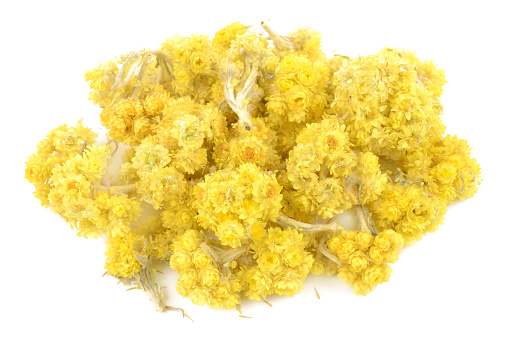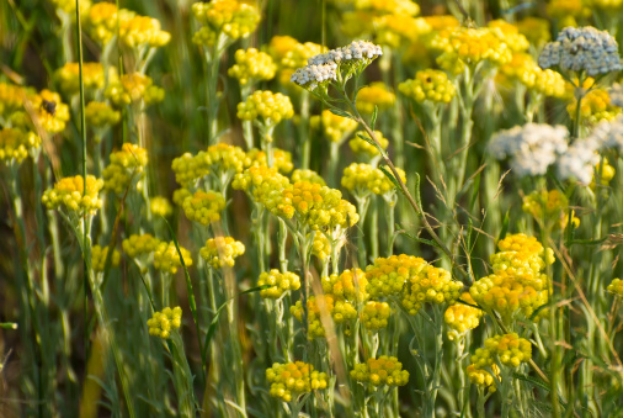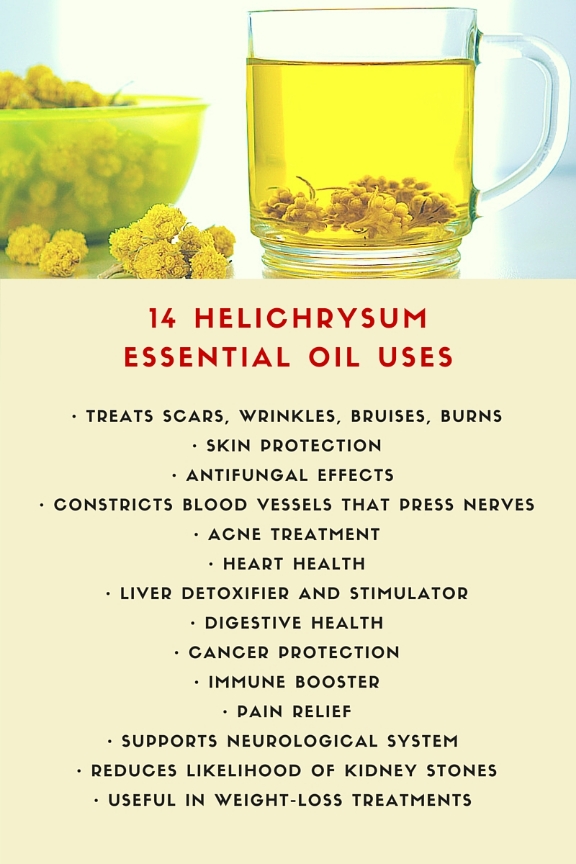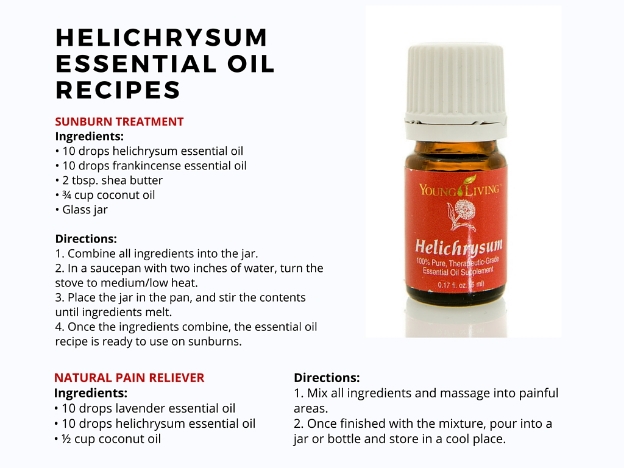 Helichrysum essential oil is a classic example of an easily recognizable success story in aromatherapy.
Helichrysum essential oil is a classic example of an easily recognizable success story in aromatherapy.
What is helichrysum essential oil?
Helichrysum oil is a pale yellow to red liquid with a rich scent similar to honey and a delicate undertone resembling tea.
It’s made from the flowers of the helichrysum plant (Helichrysum italicum), and belongs to the Asteraceae family, the same as the sunflower.

Helichrysum flowers
The flower is also native to the Mediterranean region, and it has been used medicinally in countries such as Bosnia, Herzegovina, Portugal, and Turkey. It’s mainly cultivated in France, Spain, and Italy. There are over 600 Helichrysum species, and it’s also often called curry plant, everlasting, or immortelle oil.
14 Helichrysum Essential Oil Uses
Today, there are many helichrysum oil uses. It’s known for its antioxidant, anti-inflammatory, anti-allergenic, antimicrobial, antiseptic, and analgesic properties, among many others. The many different compounds in Helichrysum italicum extract have been heavily studied. For instance, the phloroglucinols and acetophenones (flavonoids)_in helichrysum oil are thought to contain the strongest antioxidant properties. Helichrysum italicum essential oil may treat various conditions, including digestive problems, infections, wounds, respiratory conditions, and heart and nervous system issues.
1. Skin Irritations and Diseases
There are various helichrysum essential oil skin benefits. For example, a review published in the International Journal of Antimicrobial Agents in 2001 (1) found that the terpene compounds and flavonoids in helichrysum were effective against fungus and bacteria that caused skin irritations such as delayed wound healing, skin infections, and rashes. You can use helichrysum essential oil for scars, wrinkles, bruises, burns, hives, eczema, and psoriasis. Using helichrysum essential oil for skin health requires a carrier oil such as jojoba or coconut.
2. Sunburns and Skin Protection
Helichrysum can also help relieve pain after sunburns, and hydrate burnt skin. It’s also thought to block UV-light damage that may lead to skin cancer. Helichrysum essential oil is best for skin health when combined with coconut oil, and applied to the skin for relief or protection. See the helichrysum essential oil sunburn recipe below.
3. Candida
Candida albicans may be the root cause of the persistent fatigue and digestive problems that many people experience on a daily basis. In a review published in the Journal of Ethnopharmacology in 2014 (2), the unique compounds in helichrysum oil (terpenoids, phloroglucinols, and acetophenones) demonstrated antifungal effects against candida overgrowth in various clinical studies.
4. Tinnitus
Tinnitus is also known as a ringing in the ears. The condition is common, affecting about one in five people. Potential causes of tinnitus include noise-based hearing loss, food sensitivities, adrenal gland dysfunction, and a lack of inner-ear circulation. Using helichrysum essential oil for tinnitus may be beneficial: dilute helichrysum and juniper essential oils in a carrier oil, and massage the remedy outside the ear. Regular application of this essential oil remedy may help to constrict the blood vessels that press on the nerves, which is another possible cause of tinnitus.
5. Acne Treatment
Various studies support the potent antimicrobial and antibiotic properties of helichrysum oil, so using helichrysum essential oil for acne may be a good idea. Conventional acne treatment side effects often include dry skin, cracking or peeling skin, joint pain, or dizziness. Helichrysum oil, on the other hand, helps treat acne without the unwanted side effects.
6. Heart Health
Helichrysum has been used for heart problems in European folkloric medicine for hundreds of years. A study published in the Cardiovascular Journal of Africa in 2008 (3) suggested that the hypotensive effect of helichrysum essential oil improved blood vessel function by lowering high blood pressure, increasing smooth muscle function, and reducing inflammation. These cardiovascular effects support the use of helichrysum oil against heart conditions such as hypertension.
7. Liver Detoxifier and Stimulator
The liver is one of the largest organs in the body, and is responsible for several vital functions, including processing nutrients from food, making bile, and detoxification. Helichrysum has been used for liver detoxification and stimulation for centuries. According to an article published in the Journal of Ethnopharmacology in 2000 (4), the antioxidant properties of helichrysum are responsible for its liver-protective, detoxifying, and choleretic effects. Helichrysum is commonly used as a liver disease treatment, and it helps cleanse the body of heavy metals and other toxins.
8. Digestive Health
As a natural cholagogue, helichrysum oil promotes the release of bile, and can therefore improve digestion. A study published in the Journal of Ethnopharmacology in 2013 (5) supported the antispasmodic effects of helichrysum inside an inflamed digestive system; helichrysum decreased gut swelling, digestive pain, and cramping.
9. Cancer Protection
Research indicates that the special flavonoid antioxidant compounds in helichrysum may inhibit cancer growth and oxidative stress. An article published in the journal Cytotechnology in 2009 (6) also indicated that helichrysum may protect against cancerous tumor growth, cell mutation and death, and radiation-induced DNA damage in both human and animal studies.
10. Immune Booster
The anti-inflammatory and gut-healing properties of helichrysum make the essential oil a natural immune booster. Studies have found that the phloroglucinols and flavonoids in helichrysum oil can inhibit harmful viruses, bacteria, and fungi, which means that it could be used in the treatment of respiratory conditions such as colds, coughs, asthma, sinusitis, and bronchitis. Helichrysum is even strong enough to reduce the risk of getting HIV.
11. Pain Relief
Research has found that helichrysum oil reduces muscle, joint, and nerve pain by improving circulation and lowering inflammation and swelling. Its anti-inflammatory and analgesic properties make it an effective pain reliever for symptoms of exercise-related injuries, fibromyalgia, and arthritis. It’s good idea to combine helichrysum with lavender oil to reduce emotional stress and pain.
12. Multiple Sclerosis
Multiple sclerosis is a chronic and progressive degenerative disease, caused by the gradual loss of the myelin sheath. Helichrysum essential oil may support the neurological system to potentially treat multiple sclerosis symptoms, including loss of balance, deep fatigue, impaired speech, facial paralysis, and numbness or weakness of the limbs.
13. Kidney Stones
Helichrysum and lemon essential oils may decrease kidney stone risk through the detoxification of the liver and kidneys. Rubbing helichrysum oil over the lower abdomen twice daily may reduce the likelihood of kidney stones.
14. Weight Loss
In a study published in the Journal of Medicinal Food in 2015 (7), helichrysum and grapefruit extracts were found to be useful in weight-loss treatments along with a low-calorie diet. In the study, rats separated into test and control groups, and the test groups were given helichrysum and grapefruit extracts for five weeks. The test group rats gained less weight compared to the control group. The extracts also improved factors related to obesity, including high insulin levels and inflammation markers.
Other Health Benefits
Helichrysum essential oil may also be an effective remedy for varicose veins. The essential oil should be diluted with a carrier oil such as sesame to help relieve stressed veins. Helichrysum oil may support the neurological system, and can therefore improve your mood and reduce stress. You can also use helichrysum essential oil for stretch marks, allergies, insect bites, fever, hemorrhoids, headaches, and sinus relief. It also makes for a great helichrysum essential oil hearing loss remedy.

How to Use Helichrysum
What is the best way to use helichrysum essential oil? This oil can be inhaled either directly or with a diffuser, or it can be added to a bath. Two to four drops of undiluted oil can also be applied to the skin for certain conditions. In aromatherapy, helichrysum is thought to blend well with other essential oils such as Peru balsam, clove, clary sage, rose, geranium, neroli, juniper, cypress, rosemary, bergamot, lavender, tea tree, thyme, ylang ylang, vetiver, palmarosa, oregano, oakmoss, black pepper, chamomile, and citrus.
There are various essential oil brands, though some offer higher-quality oils than others. Be sure to do your research before purchasing any essential oils products.
Homemade Helichrysum Essential Oil Recipes
There are a number of different essential oil recipes that use helichrysum essential oil. Here are a couple you can try:
Sunburn
Ingredients
- 10 drops helichrysum essential oil
- 10 drops frankincense essential oil
- 2 tbsp. shea butter
- ¾ cup coconut oil
- Glass jar
Directions
- Combine all ingredients into the jar.
- In a saucepan with two inches of water, turn the stove to medium/low heat.
- Place the jar in the pan, and stir the contents until ingredients melt.
- Once the ingredients combine, the essential oil recipe is ready to use on sunburns.
Natural Pain Reliever
Ingredients
- 10 drops lavender essential oil
- 10 drops helichrysum essential oil
- ½ cup coconut oil (or another carrier oil, such as jojoba)
Directions
- Mix all ingredients and massage into painful areas.
- Once finished with the mixture, pour into a jar or bottle and store in a cool place.

Cautions and Side Effects of Helichrysum
In general, helichrysum essential oil has very few side effects. It can be used on the skin diluted without any adverse reactions. An allergic reaction is only experienced in rare cases. That said, due to its anticoagulant properties, this essential oil should be avoided by people who have undergone surgery or are at risk of internal hemorrhaging. Helichrysum should not be ingested unless under the supervision of a doctor.
Read Next:
